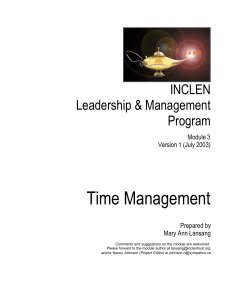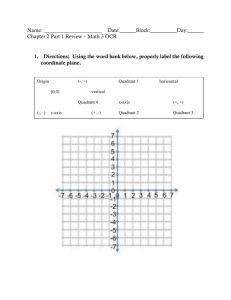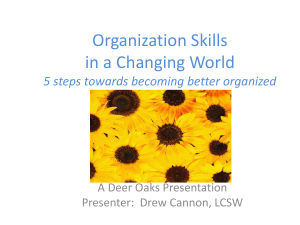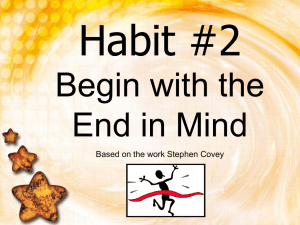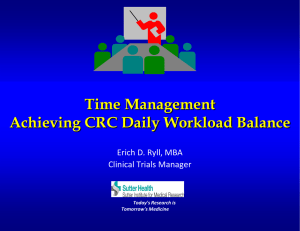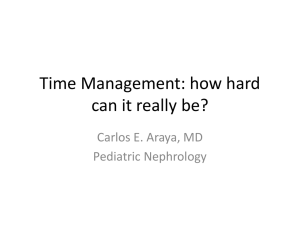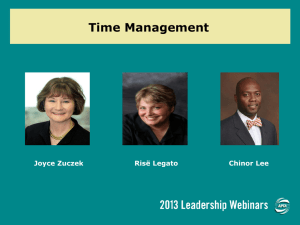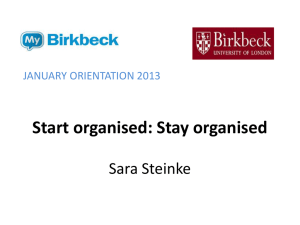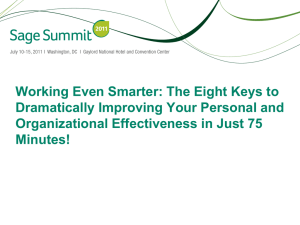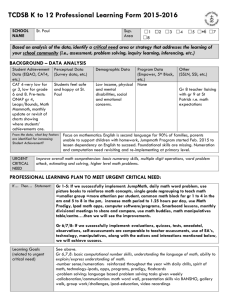UNIT 5: WORKPLACE ISSUES
advertisement
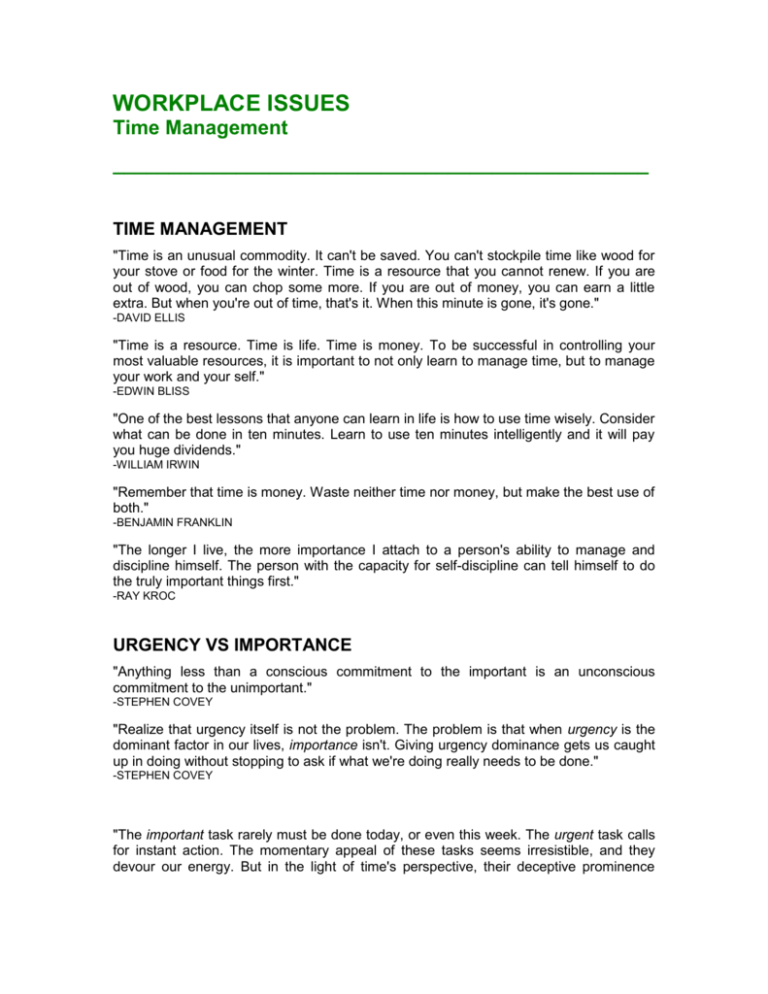
WORKPLACE ISSUES Time Management ________________________________________________ TIME MANAGEMENT "Time is an unusual commodity. It can't be saved. You can't stockpile time like wood for your stove or food for the winter. Time is a resource that you cannot renew. If you are out of wood, you can chop some more. If you are out of money, you can earn a little extra. But when you're out of time, that's it. When this minute is gone, it's gone." -DAVID ELLIS "Time is a resource. Time is life. Time is money. To be successful in controlling your most valuable resources, it is important to not only learn to manage time, but to manage your work and your self." -EDWIN BLISS "One of the best lessons that anyone can learn in life is how to use time wisely. Consider what can be done in ten minutes. Learn to use ten minutes intelligently and it will pay you huge dividends." -WILLIAM IRWIN "Remember that time is money. Waste neither time nor money, but make the best use of both." -BENJAMIN FRANKLIN "The longer I live, the more importance I attach to a person's ability to manage and discipline himself. The person with the capacity for self-discipline can tell himself to do the truly important things first." -RAY KROC URGENCY VS IMPORTANCE "Anything less than a conscious commitment to the important is an unconscious commitment to the unimportant." -STEPHEN COVEY "Realize that urgency itself is not the problem. The problem is that when urgency is the dominant factor in our lives, importance isn't. Giving urgency dominance gets us caught up in doing without stopping to ask if what we're doing really needs to be done." -STEPHEN COVEY "The important task rarely must be done today, or even this week. The urgent task calls for instant action. The momentary appeal of these tasks seems irresistible, and they devour our energy. But in the light of time's perspective, their deceptive prominence fades; with a sense of loss we recall the vital task we pushed aside. We realize we've become slaves to the tyranny of the urgent." -CHARLES HUMMEL "The purpose of learning to employ every minute properly is to unclutter our hours, deliver us of feverish activity and earn us true leisure." -ROBERT UPDEGRAFF Urgency and importance seldom appear together. Important things are seldom urgent and urgent things are seldom important. Unfortunately, many of us spend our lives fighting fires under the tyranny of the urgent." -MICHAEL LE BOEUF TIME BALANCE Stephen Covey, the author of Principle Centered Leadership, Seven Habits of Highly Effective People and First Things First, presents his time management strategies as principles of personal management. He states, "It is self-awareness, imagination, conscience and, most importantly, independent will that really make effective selfmanagement possible." He introduces his time management matrix as a balance between two factors... Urgency... and Importance. What are the results of how we choose to spend our time and focus our energies? Consider the time management matrix and the following results. Note that Quadrant II is the preferred quadrant for responsible people. ______________________________________________________________________ Quadrant I Urgent / Important The Quadrant of Crisis. Pressing problems, deadline-driven projects and meetings. Handling irate customers, meeting deadlines, repairing broken equipment, emergency medical incidents, tending to a crying child. This is where we manage, where we produce, and where we bring our experience and judgment to bear in responding to many needs and challenges. We can't ignore these tasks. Many important activities become urgent through procrastination. Results: stress, burnout, crisis management, and always putting out fires. Quadrant II Not Urgent / Important The Quadrant of Quality. Preparation, anticipation and prevention of problems, values clarification, relationship building, long-range planning, recreation, empowerment of self and others. Recognizing new opportunities, broadening our minds and increasing our skills through reading and continuous professional development and education, preparing for important meetings, and investing in relationships through deep, honest listening. This is where we increase our ability to do by preventing tasks from becoming urgent. This is the arena of personal leadership. Results: vision, perspective, balance, discipline, control and fewer crises. Quadrant III Urgent / Not Important The Quadrant of Deception. Interruptions, some phone calls and mail, some reports and meetings, drop-in visitors, many proximate pressing matters, many popular activities. Most of these activities, if they're important at all, are only important to someone else. We spend a lot of time meeting other people's priorities and expectations. We deceive ourselves in thinking we're engaged in worthwhile pursuits. Results: short term focus, seeing goals and plans as worthless, feeling victimized and out of control, and shallow or broken relationships. Quadrant IV Not Urgent / Not Important The Quadrant of Waste. Trivia, busy work, some phone calls and mail, time wasters, pleasant "escape" activities, excessive television, mindless activities, gossiping. Results: total irresponsibility, being fired from jobs, and being overly dependent on others. ______________________________________________________________________ QUALITY TIME "Many important things that contribute to our overall objectives and give richness and meaning to life don't tend to act upon us or press us. Because they're not urgent, they are the things we must act upon." -STEPHEN COVEY What activities that you know if you did superbly well and consistently would have significant positive results in your personal and professional life? Reacting to this question, activities that tend to be identified as important include the following: Improving communication... Better preparation... Better planning and organizing... Taking better care of self... Seizing new opportunities... Personal development... Empowerment. CHRONOS & KAIROS The Greek word chronos describes chronological time. It is seen as linear and sequential. No second is worth any more than any other second. We might ask: Did you make good time? The Greek word kairos, on the other hand, describes appropriate time or quality time. Time is something to be experienced. It is measured in terms of the value you get out of it. We might ask: Did you have a good time? "We want to make good time. But for us now this is measured with emphasis on good rather than time. And when you make that shift in emphasis the whole approach changes." -ROBERT PIRSIG / Zen & The Art Of Motorcycle Maintenance PRIORITIES Stephen Covey, in his book, First Things First, describes the time management contest. He says, "Our struggle to put first things first can be characterized by the contrast between two powerful tools that direct us: the clock and the compass." The Clock... Represents our commitments, appointments, schedules, goals, activities... What we do with, and how we manage our time. The Compass... Represents our vision, values, principles, mission, conscience, direction... What we feel is important and how we lead our lives. "The struggle comes," Covey explains, "when we sense a gap between the clock and the compass -- when what we do doesn't contribute to what is most important in our lives. For some of us, the pain of the gap is intense. We can't seem to walk our talk. We feel trapped, controlled by other people or situations. We're always responding to crises -- putting out fires and never making time to do what we know would make a difference. We feel as though our lives are being lived for us." "We're constantly caught up in the thick of thin things." -NEAL MAXWELL "In the absence of clearly defined goals, we are forced to concentrate on activity and ultimately become enslaved by it." -CHUCK COONRADT "We've painstakingly climbed the ladder of success rung by rung only to discover as we reached the top rung that the ladder is leaning against the wrong wall. In our race up the rungs, we simply did not take time to do what really mattered most." -STEPHEN COVEY Things which matter most must never be at the mercy of things which matter least." -GOETHE "Look at the word responsibility... response... ability... the ability to choose your response. Highly proactive people recognize that responsibility. They do not blame circumstances, conditions or conditioning for their behavior. Their behavior is a product of their own conscious choice, based on values, rather than a product of their conditions, based on feelings. Because we are, by nature, proactive, if our lives are a function of conditions and conditioning, it is because we have, by conscious decision or by default, chosen to empower those things to control us." -STEPHEN COVEY "We're constantly making choices about the way we spend our time, from the major seasons to the individual moments in our lives. We're also living with the consequences of those choices. And many of us don't like those consequences -- especially when we feel there's a gap between how we're spending our time and what we feel is deeply important in our lives. Putting first things first is an issue at the very heart of life. Almost all of us feel torn by the things we want to do, by the demands placed on us, by the many responsibilities we have. We feel challenged by the day-to-day and moment-bymoment decisions we must make regarding the best use of our time." -STEPHEN COVEY ________________________________________________ MICHAEL LEBEAU 2007
